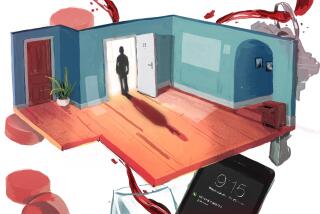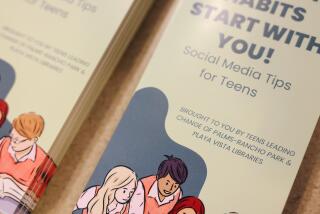When a Date Turns to Hate
- Share via
It’s not something you see coming. But they begin to bring you down emotionally by calling you names. It gets worse.
--A young victim of dating violence
*
Experts on the prevention of dating violence have a warning for teenage girls: Beware the B-word.
Hurled at a girl by a boy, this five-letter word spells trouble ahead.
That’s the message of a 15-minute video--”He Loves Me . . . He Loves Me Not”--that premiered Friday at a Newport Beach benefit for Human Options.
As hundreds of guests watched from the ballroom of the Four Seasons hotel, they saw an all-too-common tale of dating violence unfold on a giant screen: Boy meets girl. Boy charms girl. Boy verbally abuses girl. Girl loses her self-respect. Girl struggles to end the relationship.
Experts estimate that 25% of high school students experience violence in a dating relationship.
And yes, verbal abuse is a form of violence, says Sharon Gellatly, director of education for Human Options, an Orange County shelter for battered women.
“One thing I always say to [high school girls]: If I had only one minute to spend with you, I’d tell you that if you’re going out with a boy who calls you a bitch, get out of the relationship,” she said. “It’s the telltale sign that a boy doesn’t respect you. It’s an angry word, a violent word--a word that says ‘I’m better than you.’ And the boy who uses it is someone walking around with a need to be in control.”
Produced by Human Options for use as a teaching tool in Orange County schools, the video is based on the true story of two local high school students.
On the condition that her name not be used, one of the girls, now 21, shared the story of her abusive relationship during a recent phone interview:
“We were in the same high school, grew up in the same neighborhood,” she said. “He was really charming, friendly. But he was also very manipulative. When these guys are around people, they seem so easy to get along with. You’d never guess there was someone else underneath.”
Early in their relationship, the video portrays them as a lighthearted couple sharing laughter-filled outings.
Then, the boy starts checking up on her when they are not together. He calls her late at night from a car phone while he is parked near her home, watching her bedroom window with binoculars. About six months into the relationship, he begins calling her derogatory names--repeatedly.
(Several times in the video, the boy is portrayed at home, listening behind a closed door to his father calling his mother the same names.)
It isn’t long before the girl begins to believe what he says about her. “The bad names begin to make you feel worthless, especially when you’re a teen to begin with. You’re always confused, not sure of who you are anyway. I started to believe him, because he was my boyfriend. If he saw me that way, then others must too.”
Before she found the strength to end the relationship, the girl was slapped, kicked and stalked by the boy.
Her advice to teenage girls:
“It’s one thing to get in an argument and say things you don’t mean; it’s another to have someone tell you on a constant basis that you are less than something. When that starts, it’s a warning sign that there’s more to come, and it’s not going to get any better.”
*
Gellatly, who speaks about the prevention of dating violence to about 10,000 Orange County teens annually, says there are other warning signs: “Jealousy. Late-night phone calls. Do they take up your entire life? These are big signs about power and control. That’s what this is really all about.”
These troubled young men are often from abusive homes. Most of them have “controlling fathers,” noted Vivian Clecak, executive director of Human Options.
They’re criticized a lot and crave attention from a girl to help them feel good about themselves. “So, if a girl’s not perfect--isn’t paying enough attention to a boy, for example--they feel hurt and demeaned. They blow up,” Clecak said.
In the violent dating relationship, the boy is thinking, “Now I’m going to be the one in power because, as a child, I didn’t own any power,” Gellatly observed.
Being abused as a teenager sets a girl up for more abuse as an adult. “A teenage girl is just coming into the fact that she has some autonomy, is a person with her own opinions,” Gellatly said. “And then, here comes somebody who says, ‘No. You are going to be what I want you to be.’
“Often, by the time they get to [the shelter] by age 27 or so, they’ve never been a person. That’s what the teen years are about, becoming a person. That never happens for these girls.”
*
Amid huge gold statues of Oscar, the video was given a Hollywood-style premiere Friday after guests enjoyed a cocktail reception and sit-down dinner.
But not before attorney Jack Schoellerman of Corona del Mar was presented with the shelter’s Dove Award for his generosity and leadership. The Schoellerman Family Trust underwrote the production of the video.
“The video follows Human Options’ path of going more into the area of abuse prevention,” said Schoellerman, chairman of the shelter’s honorary board. “You can only build so many shelters. Ultimately, we have to find a way to attack the problem from a preventive point of view.”
Also among guests: Julie Hill, board chairwoman; Celina Doka and Robert Novelli, event chairs; and David Dukes, event emcee.
Information: (714) 737-5242.
More to Read
Sign up for Essential California
The most important California stories and recommendations in your inbox every morning.
You may occasionally receive promotional content from the Los Angeles Times.













